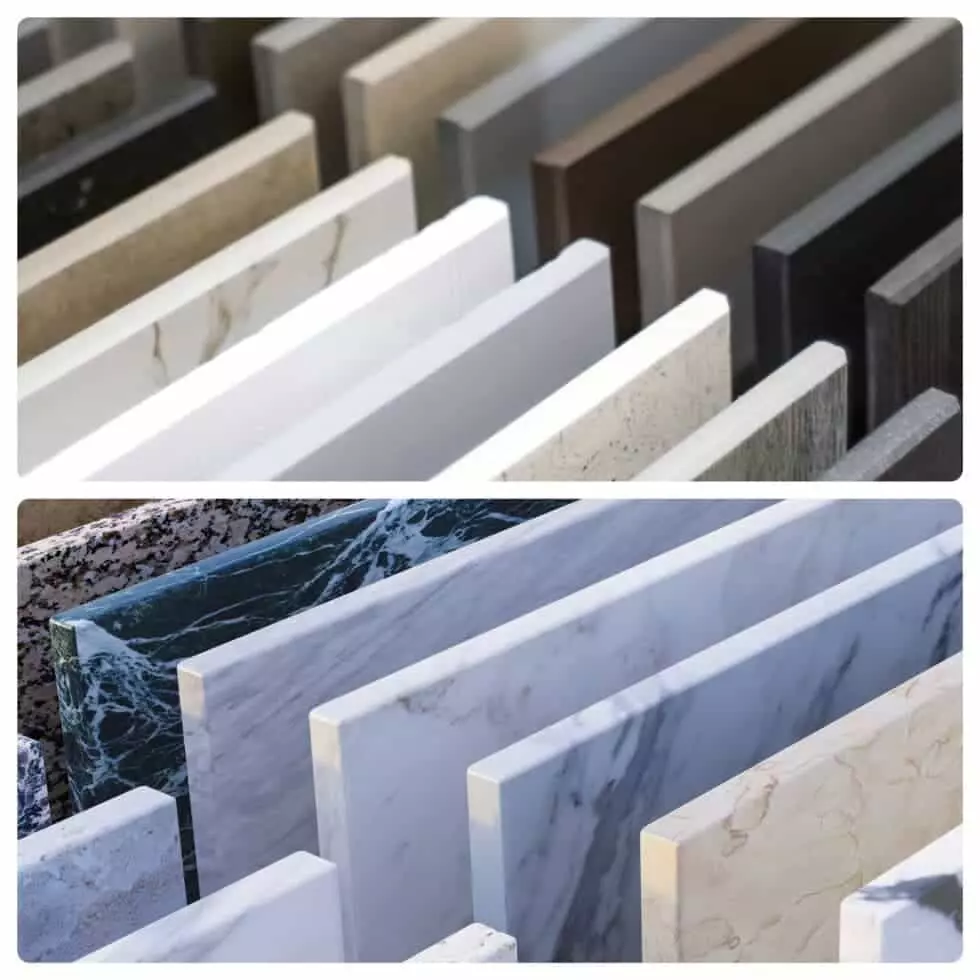Quartz vs. Quartzite
Introduction:
When it comes to choosing the perfect material for your countertops or other home surfaces, quartz and quartzite are two popular options that often cause confusion due to their similar-sounding names. While they may share some similarities, quartz and quartzite are distinct in terms of their composition, appearance, durability, and maintenance requirements. In this blog, we will delve into the characteristics of both materials and highlight the key differences to help you make an informed decision for your next home improvement project.
Composition:
Quartz:
Quartz countertops are engineered stone surfaces made primarily from quartz crystals, which are bound together using resins and pigments. These countertops typically contain about 90-95% quartz combined with 5-10% resins, polymers, and pigments. The manufacturing process allows for a wide range of colors and patterns to be created, giving homeowners ample design options.
Quartzite:
On the other hand, quartzite is a natural stone that forms from sandstone subjected to intense heat and pressure over time. It is primarily composed of quartz grains fused together with minerals such as mica, feldspar, and other trace elements. Quartzite is renowned for its elegance and unique veining patterns, making it a popular choice for adding natural beauty to any space.
Appearance:
Quartz:
One of the significant advantages of quartz countertops is their versatility in terms of appearance. Since quartz is an engineered stone, it can be manufactured in a wide array of colors, patterns, and textures, including realistic veining similar to that of natural stone. Whether you prefer a classic marble look or a contemporary solid color, quartz offers endless possibilities to complement your design aesthetic.
Quartzite:
Quartzite, being a natural stone, possesses a distinct and timeless beauty. It displays a wide range of colors, including white, gray, beige, pink, and even exotic shades like blue and green. The veining and patterns found in quartzite are unique to each slab, making it a visually stunning choice. If you appreciate the charm of natural stone and desire a one-of-a-kind appearance for your surfaces, quartzite may be the perfect fit.
Durability:
Quartz:
Quartz countertops are engineered to be highly durable and resistant to scratches, stains, and heat. The combination of quartz crystals and resins creates a non-porous surface that is less susceptible to damage from spills and household chemicals. Additionally, the manufacturing process ensures that quartz countertops maintain their color consistency over time, unlike natural stone surfaces that may fade or change appearance.
Quartzite:
Quartzite is renowned for its exceptional durability. It is harder than most natural stones, including granite, which contributes to its superior resistance to scratches and chipping. Quartzite’s high heat resistance makes it suitable for use in kitchens, where hot pots and pans are regularly placed on countertops. However, it is worth noting that, unlike quartz, quartzite is a natural stone with a porous composition. Hence, it requires sealing to prevent staining and should be resealed periodically to maintain its longevity.
Maintenance:
Quartz:
One of the key advantages of quartz countertops is their low maintenance requirements. As an engineered material, quartz is non-porous, which means it does not require sealing. Quartz countertops can be easily cleaned with mild soap and water or a non-abrasive household cleaner. The non-porous surface also makes quartz highly resistant to bacterial growth, making it
Quartzite:
While quartzite is a durable natural stone, it does require more maintenance compared to quartz countertops. Due to its porous nature, quartzite is susceptible to staining if spills are not promptly cleaned. To protect the surface from staining, it is crucial to seal quartzite countertops upon installation and reseal them periodically. Regular cleaning with mild soap and water is recommended, avoiding harsh chemicals or abrasive cleaners that can damage the sealant.
Cost:
Quartz:
When it comes to cost, quartz countertops generally fall into the mid to high price range. The price can vary depending on factors such as the brand, design, thickness, and installation costs. While quartz countertops may have a higher upfront cost compared to some natural stone options, their durability, low maintenance, and long lifespan make them a cost-effective investment in the long run.
Quartzite:
Quartzite countertops are typically considered a higher-end option and may come with a higher price tag than quartz. The rarity and natural beauty of quartzite contribute to its premium cost. However, it’s essential to consider the unique aesthetic appeal and durability of quartzite when evaluating its value.
Conclusion:
In summary, while quartz and quartzite share a common base of quartz mineral, they differ significantly in terms of their composition, appearance, durability, and maintenance requirements. Quartz countertops offer a wide range of design options, excellent durability, and low maintenance, making them a popular choice for many homeowners. On the other hand, quartzite countertops provide the elegance and natural beauty of a unique natural stone, along with exceptional durability, albeit requiring sealing and more maintenance.
Consider your personal preferences, budget, and lifestyle when choosing between quartz and quartzite. Consulting with a reputable countertop professional can further assist you in making an informed decision based on your specific needs. Ultimately, both quartz and quartzite can enhance the aesthetic appeal and functionality of your home, offering lasting beauty for years to come.

